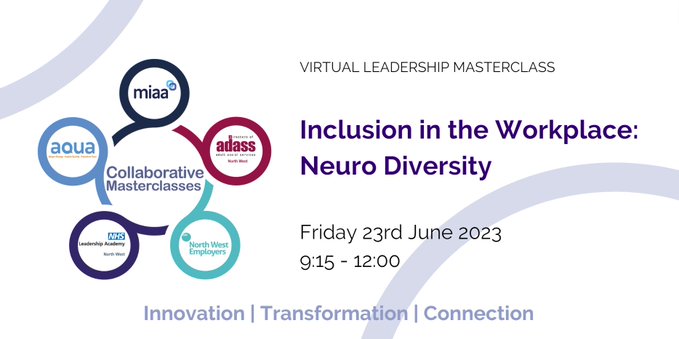Collaborative Masterclass: Inclusion in the workplace

Neurodiversity is a term used to describe conditions such as autism, ADHD, dyslexia and dyspraxia and many others. It reframes these conditions as natural variations in the way that people think and process information.
Research suggests that between 15 – 20% of people may be neurodivergent (Doyle, 2020).
The latest Collaborative Masterclass provided a space for leaders to explore inclusion in the workplace, gain a better understanding of neurodivergence and learn how to implement change to become a more inclusive employer.
With contributions from Laurence Turner, Head of Research & Policy at GMB, Jon Salmon and Holly Sutcliffe, we were able to hear from a range of neurodivergent speakers who shared their unique experiences and thoughts on inclusive workplaces.
The masterclass started with an exploration of neurodiversity in the workplace, led by our first speaker of the session Laurence Turner. Laurence shared some key facts around neurodiversity and explored the reality of discrimination that can often be faced in a workplace.
He also prompted us to think about:
- How we can think differently at work to support colleagues
- Some practical tips to support our neurodivergent colleagues,
- Reasonable adjustments that can be made, particularly to support those without a formal diagnosis
We then heard from Jon Salmon, mental health campaigner, about his personal experience of dyslexia in the workplace. Jon prompted us to think about how we can understand and support dyslexia in the workplace and openly shared his personal experiences.
- 1 in every 10 people in the UK has some degree of dyslexia
- It is important to recognise the different thinking skills people with dyslexia have
- We need to reframe dyslexia and empower people to utilise the skills they have
To end, Jon shared his top tips and support for workplaces to embrace and support colleagues with dyslexia.
- Take time to understand what dyslexia means for the person
- Encourage and support those with dyslexia
- Make consideration for the recruitment process, and the impact this may have on neurodivergent applicants
- Listen and respond, different people need different things
Our final speaker for the day, Holly Sutcliffe, neurodivergent advocate and support, shared her not ‘the’ autistic experience.
Holly shared her powerful story of being diagnosed with autism later in life, after recognising the support she needed to seek for her daughter, also autistic. Key takeaways from Holly’s session included how we can support neurodivergent colleagues and peers to be at their best:
- Listen to others
- Acceptance and understanding
- Be accommodating
- Celebrate others
You can watch the full webinar recording here.